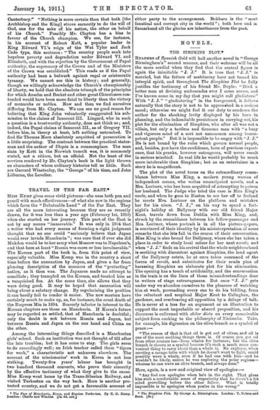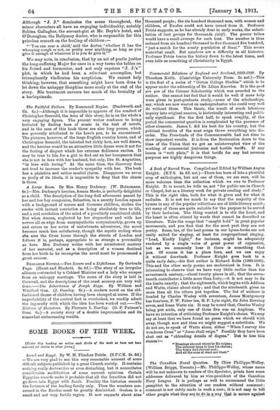NOVELS.
THE STMPK1NS PLOT* READERS of Spanish Gold will hail another novel in " George Birmingham's" second manner, and their welcome will be all the more cordial when they find that the central figure is again the inimitable "J. J." It is true that " J. J." is married, but the fetters of matrimony have not tamed his intrepid spirit, and throughout The Simpkins Plot he fully justifies the testimony of his friend Mr. Doyle: " Divil better man at devising ambuscades ever I come across, and I've known some in my day that you might call gladiators:" With "J. J." " gladiatoring " in the foreground, it follows naturally that the story is not to be approached in a serious mood; otherwise we might feel it our duty to condemn the
author for the shocking levity displayed by his hero in planning, and the indomitable persistence in carrying out, his plot for the elimination of Simpkins, who after all was not a villain, but only a tactless and tiresome man with " a busy and vigorous mind of a sort not uncommon among incom- petent people." But it is impossible to be angry with " J. J."
He is not bound by the rules which govern normal people, and, besides, you have the confidence, born of previous experi- ence, that his pranks, however outrageous, will never result in serious mischief. In real life he would probably be much more intolerable than Simpkins ; but as an entertainer in a story he is magnificent.
The plot of the novel turns on the extraordinary resem- blance between Miss King, a modern young woman of independent means, who writes emancipated novels, and a
Mrs. Lorimer, who has been acquitted of attempting to poison her husband. The Judge who tried the case is Miss King's uncle, and when he goes to Euston to see her off to Ireland he meets Mrs. Lorimer on the platform and mistakes her for his niece. "J. J.," on his way to spend a, fort- night's holiday at Ballymoy with our old friend Major Kent, travels down from Dublin with Miss King, and, struck by the resemblance between his fellow-passenger and Mrs. Lorimer, whose portrait is in all the picture-papers, is convinced of their identity by his misinterpretation of some
remarks that she lets fall in the course of their conversation. Miss King is also bound for Ballymoy, where she has taken a place in order to study local colour for her next novel; and when " J. J." finds on his arrival that the whole neighbourhood is seething with discontent against Simpkins, the land agent of the Ballymoy estate, he at once takes command of the forces of revolt, and substitutes for their crude plan of hamming Simpkins an elaborate plot for his elimination. The opening has a touch of artificiality, and the conversation in the train is on the lines of those misunderstandings dear to writers of stage extravaganzas. But once "J. J." gets under way we abandon ourselves to the pleasure of watching him at work, persuading every one to do his bidding, from the reluctant and sceptical Major Kent to Callaghan, the gardener, and overbearing all opposition by a deluge of talk. He is never at a loss for an argument or an illustration to support the most improbable or absurd proposition, and his discourse is enlivened with obiter dicta on every conceivable subject from cooking to the philosophy of Nietzsche. Take, for example, his digression on the olive-branch as a symbol of
peace—
"The reason of that is that oil is got out of olives, and oil is one of the most soothing things there is. Of course you get oil from other sources too—from whales for instance; but the olive branch is chosen as a symbol because it's Ebel a much more con- venient thing to carry about than a whale is. No explorer, when meeting a savage tribe with which he doesn't want to fight, could possibly wave a whale, even if he had one with him—and he wouldn't be likely, unless he was exploring the polar regions— whereas he can wave an olive branch, and always does."
Here, again, is a new and original view of apologies :-
"Any fool can apologise when he's in the right. That gives him such a comfortable sense of superiority that he doesn't a bit mind grovelling before the other fellow. What is totally impossible is to apologise when you're in the wrong."
• The Simpkins Plot. By George A. Birmingham. London: T. Nelson and Bons. [25.]
Although "J. J." dominates the scene throughout, the minor characters all have an engaging individuality, notably Sabina Gallagher, the servant-girl at Mr. Doyle's hotel, and O'Donoghue, the Ballymoy doctor, who is responsible for this priceless remark on the feeding of children :— " You can rear a child,' said the doctor, ' whether it has the whooping cough or not, on pretty near anything, so long as you give it enough of whatever it is you do give it.'
We may note, in conclusion, that by an act of poetic justice the long-suffering Major for once in a way turns the tables on his friend and tormentor, and not only capsizes "J. J.'s " plot, in which he had been a reluctant accomplice, but triumphantly vindicates his scepticism. We cannot help thinking, however, that something might have been done to let down the unhappy Simpkins more easily at the end of the story. His treatment savours too much of the brutality of a harlequinade.







































 Previous page
Previous page